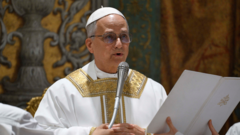Pope Leo XIV, born in Chicago and a long-time resident of Peru, has made history as the first American pope. Navigating a church facing modern complexities, he carries the legacy of his predecessor, Pope Francis, while being influenced by both American and Latin American cultures. His initial addresses emphasize unity and compassion, portending an era that may resemble a blend of tradition and contemporary social issues.
Pope Leo XIV: The First American Pontiff's Promising Yet Challenging Path Ahead

Pope Leo XIV: The First American Pontiff's Promising Yet Challenging Path Ahead
As Pope Leo XIV, formerly Cardinal Robert Francis Prevost, takes the helm of the Roman Catholic Church, he stands at a crossroads filled with expectations and potential reforms.
Pope Leo XIV is set to celebrate his inaugural Mass as the leader of over 1.4 billion Roman Catholics on Friday morning, marking the beginning of his papacy that many hope will navigate the challenges confronting the Roman Catholic Church. Elected during a momentous conclave on May 8, 2025, Leo XIV, previously known as Cardinal Robert Francis Prevost, resonates as a unifying figure amidst the church's diverse global community. Following his election, he emerged before the crowds in St. Peter’s Square, garnering enthusiastic support as the first American pope.
Reflecting on his dual origins, Leo XIV was born and educated in Chicago but forged a significant portion of his religious identity in Peru, where he served as bishop for two decades. His focus on "building bridges" during his initial address suggests a commitment to inclusivity, but specific declarations on his governance style remain closely guarded. As an acolyte of Pope Francis, whose reforms aimed at decentralizing church authority, Leo XIV is anticipated to maintain a forward-thinking lens on ecclesiastical matters.
Multiple facets of his background will likely influence his tenure. With American Catholic demographics shifting, Leo’s identity resonates strongly in the United States, where 20 percent of adults identify as Catholic. However, supporters in Latin America, where he has established deep roots, celebrate his selection as theirs, eager for a continued emphasis on social justice and outreach to impoverished communities.
Yet, the legacy of his predecessor looms large. While Pope Francis challenged structures within the church, tackling issues such as clergy sexual abuse and advocating for marginalized groups, expectations for continuity rightfully coalesce around how Leo XIV will handle these fraught topics. His prior role in the Vatican denotes a familiarity with church politics, but analysis suggests that his moderate personality may inspire a gentler approach compared to more charismatic leaders.
The name Leo XIV, chosen deliberately, echoes the progressive undertones of Pope Leo XIII, known for his engagement with labor rights in the industrial era. Observers speculate whether this appellation foretells a heartfelt dedication to aiding disadvantaged individuals despite possible resistance from conservative factions worried about doctrinal integrity.
In Peru, reactions to the pope's election have been jubilant, with leaders recalling his advocacy for the underprivileged during his time as a bishop. As his papacy unfolds, it remains to be seen how he will balance the diverse expectations from his global audience while ensuring the church navigates the complexities of modern moral landscapes and pressing social issues.
From immigration reform concerns, which his brother highlighted, to broader interpretations of faith in the face of technological advancement and cultural changes, Pope Leo XIV's path is charged with heavy anticipation. The new pope’s academic and pastoral insights may render him a transformative leader, yet the broader implications of his presidency are still unfolding.
In coming days, as Pope Leo XIV engages with cardinals and the media, it will offer vital clues to how he plans to govern. For now, expectations soar alongside apprehensions, as a united global church awaits its new shepherd’s initial guiding messages.




















